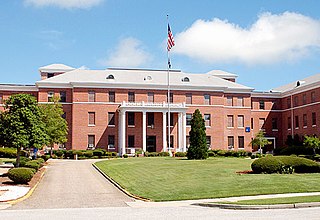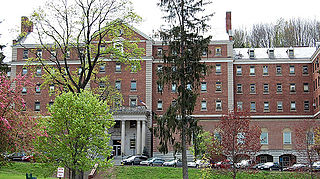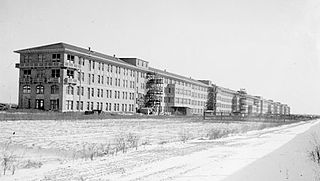
Dublin is a city in Laurens County, Georgia, United States. As of the 2020 census, the city had a population of 16,074. It is the county seat of Laurens County.

Fort Logan H. Roots, commonly known as Fort Roots, is a former U.S. Army post in North Little Rock, Arkansas. It was named in honor of Brevet Lieutenant Colonel Logan Holt Roots, U.S. Volunteers, who served with distinction in the Western Theater of the American Civil War. It was established in 1892 and garrisoned from 1896 to 1913. After World War I, the post was transferred to the Public Health Service for use as a hospital, and in 1921, an Act of Congress authorized the establishment of a hospital for veterans.

The Fort Bayard Historic District encompasses the area that was the location of Fort Bayard, a United States Army military installation north of present-day Santa Clara, New Mexico. Founded in 1866, the fort at first provided security against Native American attacks on settlers during the settlement of the region in the 19th century. It was then converted into the army's first tuberculosis sanitarium, and later became a VA hospital. The property is now the Fort Bayard Medical Center, a long-term nursing care facility operated by the state of New Mexico. The only surviving 19th-century elements of the fort are some of its landscaping, and the Fort Bayard National Cemetery. The site was designated a National Historic Landmark District in 2004.

This is a list of the National Register of Historic Places listings in Stearns County, Minnesota. It is intended to be a complete list of the properties and districts on the National Register of Historic Places in Stearns County, Minnesota, United States. The locations of National Register properties and districts for which the latitude and longitude coordinates are included below, may be seen in an online map.

The Perry Point Mansion House and grist Mill is a national historic district at Perry Point, Cecil County, Maryland, United States. It is a 2+1⁄2-story, center-passage brick house covered with gray stucco. The 30 foot by 20 foot, stone grist mill is built into a river bank and is two to three stories high. Both structures were built about 1750. Since the end of World War I when the property was acquired by the Federal government, Perry Point has been used as a rehabilitation center, a supply depot, and a psychiatric hospital, the latter use surviving and expanding to the present.

The Tuskegee Veterans Administration Medical Center began in 1923 as an old soldiers' home in Tuskegee, Alabama. It was originally called the Tuskegee Home, part of the National Home for Disabled Volunteer Soldiers system.

Salem Veteran Affairs Medical Center (VAMC) is one of the largest VA hospitals located at 1970 Roanoke Blvd. Salem, Virginia 24153. Since 1934 VAMC in Salem has been improving the health of the men and women who have so proudly served the United States Navy, United States Army, United States Air Force, United States Coast Guard and United States Marines. Health care services have been provided to more than 112,500 veterans living in a 26-county area of southwestern Virginia. Salem VAMC provided community-based outpatient clinics. In addition to the main facility in Salem, there are affiliated services in three community-based outpatient clinics. These clinics are located in Danville, Virginia, Lynchburg, Virginia, Tazewell, Virginia, Wytheville, Virginia, and Staunton, Virginia.

Bath VA Medical Center is a U.S. Veterans Administration hospital located in Bath, Steuben County, New York. Affiliated with the University of Rochester School of Medicine, it provides secondary care and operates clinics in Elmira and Wellsville, New York; and Coudersport and Wellsboro, Pennsylvania. It was added to the National Register of Historic Places in 2013, and designated a national historic district.

The Edward Hines Jr. Veterans Administration Hospital is a second-generation Veterans Health Administration hospital in Hines, Illinois, United States. It currently encompasses 174 acres (70 ha) on its campus and leases an additional 60 acres (24 ha) to the Loyola University Medical Center.

The Northampton Veterans Affairs Medical Center, formerly the Northampton Veterans Administration Hospital, is a facility of the United States Department of Veterans Affairs (VA) at 421 Main Street in the Leeds section of northern Northampton, Massachusetts. Its campus once consisted of about 286 acres (116 ha) of land, which had by 2012 been reduced to 105 acres (42 ha). The hospital was opened in 1924 to treat neuropsychiatric patients, but now provides a wider array of medical services.

The Bedford Veterans Affairs Medical Center, also known as the Edith Nourse Rogers Memorial Veterans Hospital, is a medical facility of the United States Department of Veterans Affairs (VA) at 200 Springs Road in Bedford, Massachusetts. Its campus once consisted of about 276 acres (112 ha) of land, which had by 2012 been reduced to 179 acres (72 ha). The hospital was opened in 1928 to treat neuropsychiatric patients, but now provides a wider array of medical services. Through the efforts of Congresswoman Edith Nourse Rogers, the center was expanded to offer services to women in 1947; her role led to the center being renamed in her honor by President Jimmy Carter.

Gulfport Veterans Administration Medical Center Historic District, also known as Centennial Plaza, is a 48-acre (19 ha) compound located in Gulfport, Mississippi. The facility operated as a medical center under the Veterans Administration from the 1920s until 2005, when damage from Hurricane Katrina resulted in its closure. The property was designated a Mississippi Landmark in 2010 and was added to the National Register of Historic Places in 2014.

William Jennings Bryan Dorn Veterans Affairs Medical Center is a historic hospital complex and national historic district located at Columbia, South Carolina. The district encompasses 19 contributing buildings and a covered walk. Most of the oldest buildings are two- to three-story brick structures and feature a Georgian Colonial Revival architectural style. The original buildings date to 1932, with additional buildings completed in 1937, 1945, and 1946. A major expansion occurred in the 1970s. In 1978, President Jimmy Carter named the hospital after U.S. Representative from South Carolina, William Jennings Bryan Dorn. The complex includes the hospital, recreation, dining, and residential buildings. The complex is operated by the Veterans Health Administration.

The Fayetteville Veterans Administration Hospital is a medical facility of the United States Department of Veterans Affairs at 1100 North College Avenue in Fayetteville, Arkansas. Set in a campus-like environment are a hospital and other care facilities, residences, and other utility buildings. The core of the complex, including its main hospital building, were built in 1934, and represent an architecturally cohesive collection of Colonial and Classical Revival buildings.

The Dayton Veterans Affairs Medical Center is located at 4100 West 3rd Street in Dayton, Ohio. Founded in 1867, it is one of the three oldest facilities of what is now the United States Department of Veterans Affairs. When founded, it was known as the Central Branch of the National Home for Disabled Volunteer Soldiers, and it is under this name that a portion of its campus, along with the adjacent Dayton National Cemetery, was designated a National Historic Landmark District in 2012, for its role in the history and management of veterans affairs.

Knoxville Veterans Administration Hospital Historic District is a nationally recognized historic district located in Knoxville, Iowa, United States. It was listed on the National Register of Historic Places in 2012. The first part of the property that was developed is a cemetery, which is located in the middle of the former VA golf course. It contains 40 plots. The State Industrial Home for the Blind was opened on the site of what would become the Veterans Administration Hospital on January 1, 1892. It remained in operation until April 30, 1900, when the last patient moved out. Two years later the facility was transformed into the State Hospital for Inebriates, which was a place of detention and treatment for males addicted to morphine, cocaine and other narcotics. Local citizens protested, and it was closed a few years later.

The Minneapolis Veterans Affairs Health Care System (VAHCS) is network of hospital and outpatient clinics based in Minneapolis, Minnesota, USA. It belongs to the VISN23 VA Midwest Health Care Network managed by the Veterans Health Administration of the Department of Veterans Affairs. The Minneapolis VAHCS provides healthcare for United States military veterans in areas such as medicine, surgery, psychiatry, physical medicine and rehabilitation, neurology, oncology, dentistry, geriatrics and extended care. As a teaching hospital, it operates comprehensive training programs for multiple treatment specialties. The Minneapolis VAHCS also hosts one of the largest research programs of any VA health care system and maintains research affiliations with the University of Minnesota.

The Brockton Veterans Affairs Medical Center,*Northampton Veterans Affairs Medical Center is a medical facility of the United States Department of Veterans Affairs (VA) at 940 Belmont Street in Brockton, Massachusetts. Established in 1953, it is now a satellite location of the VA Boston Healthcare System, providing a variety of comprehensive and specialized care services. The campus was listed on the National Register of Historic Places in 2022 as the Brockton VA Hospital Historic District.

The Lyons VA Medical Center is a United States Department of Veterans Affairs hospital complex located at 151 Knollcroft Road in the Lyons section of Bernards Township in Somerset County, New Jersey. Established in 1930, it is part of the VA New Jersey Health Care System. Listed as the Lyons Veterans Administration Hospital Historic District, it was added to the National Register of Historic Places on July 3, 2013, for its significance in architecture, health/medicine, and politics/government.

The East Orange VA Medical Center is a United States Department of Veterans Affairs hospital complex located at 385 Tremont Avenue in East Orange of Essex County, New Jersey. Established in 1952, it is part of the VA New Jersey Health Care System. Listed as the East Orange VA Hospital, it was added to the National Register of Historic Places on September 4, 2018, for its significance in health/medicine.






















